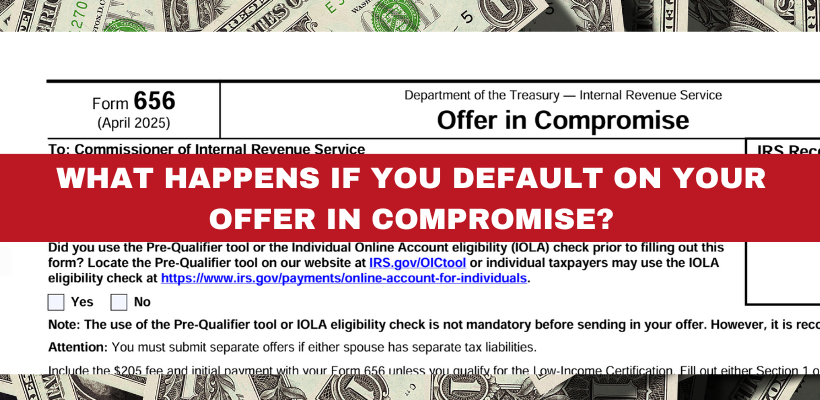When you accept an OIC, you are agreeing to a set of terms laid out by the IRS, including the payment schedule and your obligation to remain compliant with tax laws throughout the duration of the agreement. If you fail to meet these obligations, such as missing a payment, failing to file required returns, or incurring new tax liabilities, the IRS may declare your offer in default. This means that your agreement is void, and the tax relief you were granted no longer applies.
If your Offer in Compromise is declared in default, the IRS doesn’t just cancel your agreement; it can take immediate and significant actions that essentially put you back in the same position as before your OIC, or maybe even worse. The consequences of default go far beyond losing the relief you were granted, leading to even more serious financial challenges.
Here’s what happens next when the IRS declares your OIC in default
1. Reinstatement of your full tax debt.
One of the most significant consequences of defaulting on your OIC is that the IRS can reinstate your original, full tax debt. This means that the amount you owe to the IRS may go back to its previous balance before the OIC was accepted. The IRS can also add penalties and interest to your reinstated debt, which can make the situation even more difficult to manage.
2. Resumption of collection activities.
Once your OIC is in default, the IRS can resume aggressive collection actions, such as wage garnishments, bank levies, and property liens. These collection activities can severely impact your finances and personal life. The IRS is not required to provide you with another opportunity to negotiate a new payment plan or offer in compromise, so you could face harsher consequences than before.
3. No refunds for payments already made.
Another important point to remember is that any payments you have already made toward your Offer in Compromise will not be refunded if you default on the agreement. This means that, in addition to the reinstatement of your full tax debt, you will not get back any of the money you have already paid under the terms of the OIC. Essentially, you lose the relief you initially received and are left in a more difficult financial position.
What can you do if you’ve defaulted on your Offer in Compromise?
If your Offer in Compromise is declared in default, you may have a few options available to you. You may:
- Request a reinstatement. In some cases, the IRS may allow you to reinstate your OIC if you can show good cause for the default and demonstrate that you are now able to meet the terms.
- Request a new offer. If your OIC was rejected or defaulted, you may be able to submit a new Offer in Compromise, though it’s important to address any past issues and demonstrate that you can comply with the new terms.
- Apply for other IRS Programs. If an OIC is no longer an option, you may qualify for other IRS relief programs, such as a payment plan or Currently Not Collectible status.
Final Thoughts
Dealing with a defaulted Offer in Compromise can be even more stressful and confusing. If you’re worried about what to do next, getting professional help is crucial. The Law Office of Steven N. Klitzner focuses on resolving IRS tax problems, including situations where an OIC has gone into default. With the right guidance, you can better understand your options and take steps to protect yourself from further IRS collection actions. Contact our office today to discuss your situation and find out how we can help.







 Steven N. Klitzner, P.A. is a tax attorney based in Miami, Florida. He has been practicing tax law for over 40 years, and currently holds a 10.0 rating by Avvo. Mr. Klitzner was appointed to the IRS Service Advisory Council in 2021 and is...
Steven N. Klitzner, P.A. is a tax attorney based in Miami, Florida. He has been practicing tax law for over 40 years, and currently holds a 10.0 rating by Avvo. Mr. Klitzner was appointed to the IRS Service Advisory Council in 2021 and is... 





